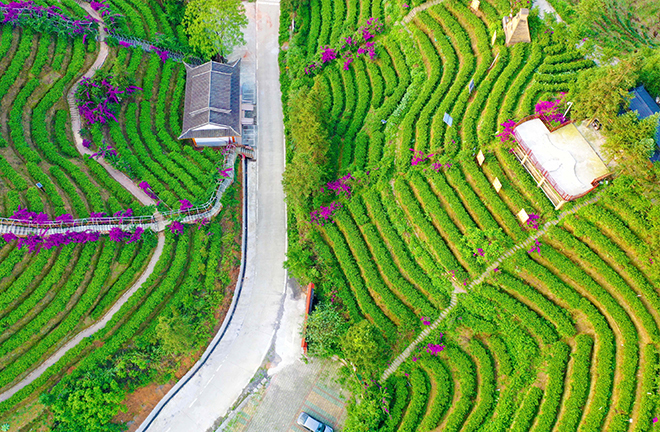


Agro-ecological compensation originated in Marxism

A tea plantation helps improve local ecological environment in Xin’an Village, Rongshui Miao Autonomous County, Guangxi Zhuang Autonomous Region Photo: Long Linzhi/CNSphoto
The most arduous and onerous task along the Chinese path to modernization is rural work. Ecological compensation is indispensable for boosting agriculture and benefiting farmers. Agro-ecological compensation is generally regarded as an incentive mechanism, guided by the principles of sustainable development, and aimed at the protection of the ecological environment through compensation for the externalities of agricultural production.
This consists of two main aspects. The first is to compensate for the cost of restoring damaged agro-ecological environments, such as conversion of farmland to forest and conversion of grazing land to grasslands, ecomigration, and comprehensive control of agricultural pollution. The second is to compensate for the cost of agricultural production conducive to the improvement of the overall ecological environment, such as the recycling of agricultural waste, the development and utilization of clean energy, and ecoagriculture.
Western economic theories have long been considered the theoretical origins of agro-ecological compensation. In spite of their value for policy making and implementation, they are far from being the “grand theory” of agro-ecological compensation. We argue that the theoretical origins of agro-ecological compensation can be found in Marxist ecological thought.
Dialectical relationship of humans and nature
In many of his works, Marx repeatedly emphasized that humans are “natural beings.” Nature is the precondition and basis of human existence, and human existence is the result of long-term, natural evolution. At the same time, nature acts as an intermediary through which humans, as “species-beings,” carry out objective activities for the purpose of survival and development. These activities rely on food, water, fuel and other resources provided by nature. As nature is the “inorganic body” of humans, human activities should not harm the health of this “inorganic body.” However, under the capitalist mode of production, human labor has degenerated into the predatory exploitation and utilization of nature, resulting in the unbridgeable chasm of “material transformation.” The “material transformation” repeatedly stressed in Das Kapital is a literal translation of the German word “stoffwechsel” which means metabolism, i.e. the natural phenomenon where material transformation follows the law of conservation of energy. Whether in nature or in humans’ social production processes, “metabolism” is subject to the “law of restitution.” As capitalists constantly take away the surplus value and break the “law of restitution,” wage laborers slip further and further into relative poverty, ecological damage gets worse, and nature verges on collapse. Human activities carried out “for ourselves” have the negative consequences of negating both nature and humans: neither nature nor human society is sustainable under the capitalist mode of production.
In terms of “natural being,” human activities are subject to the laws of nature, and natural resources are not inexhaustible. In terms of “species-being,” the capacity and desire of humans to transform nature tend to expand indefinitely. This puts humans and nature in a dialectical relationship of both opposition and unity. However, the capitalist mode of production consistently reinforces this opposition. As Marx pointed out, “All progress in capitalist agriculture is a progress in the art, not only of robbing the workers, but of robbing the soil; all progress in increasing the fertility of the soil for a given time is a progress towards ruining the more long-lasting sources of that fertility. Capitalist production, therefore, only develops the techniques and the degree of combination of the social process of production by simultaneously undermining the original sources of all wealth—the soil and the workers.”
Capitalism caused the ecological crisis
Marx believed that all “material transformation” involves the natural process of production, i.e., the relationship between humans and nature, and the social process of production, i.e. the relationship between individual human beings. In the condition of wage labor, capitalists relentlessly extract the surplus value in the capital circulation process and do not return it. Thus, the “material transformation” of commodities violates the “law of restitution” and becomes a false metabolism. The ecological cycle and the commodity exchange cycle implied by “Stoffwechsel” are integrated in Marx’s labor theory of value and theory of surplus value. This indicates that the problems of the ecological cycle are rooted in the greater cycle in which the circulation of commodities develops into the circulation of capital. The expanded reproduction of capital accumulation violates the “law of restitution.” As the surplus value is taken away by capitalists and all new value is created by wage labor, the chasm of “material transformation” keeps widening. The capitalist mode of production is therefore the root cause of the ecological crisis. In Marx’s opinion, the elimination of the chasm of “material transformation” requires the replacement of the capitalist mode of production; that is to say, the abolition of private property and alienated labor.
Marxist ecological thought is marked by extreme profundity, despite having been obscured for various reasons until the outbreak of the ecological crisis. Ecological economics, which emerged in the 20th century, advocates the optimal allocation of natural resources through economic means. While it can facilitate ecological restoration to a certain degree, its theoretical depth and breadth of vision are not on a par with Marxist ecological thought.
Liu Xuemei is from the Research Center for Xi Jinping Thought on Socialism with Chinese Characteristics for a New Era in the Ministry of Education of the PRC and the National Research Center for Socialist Political Economy with Chinese Characteristics at Jilin University of Finance and Economics.
Editor:Yu Hui
Copyright©2023 CSSN All Rights Reserved